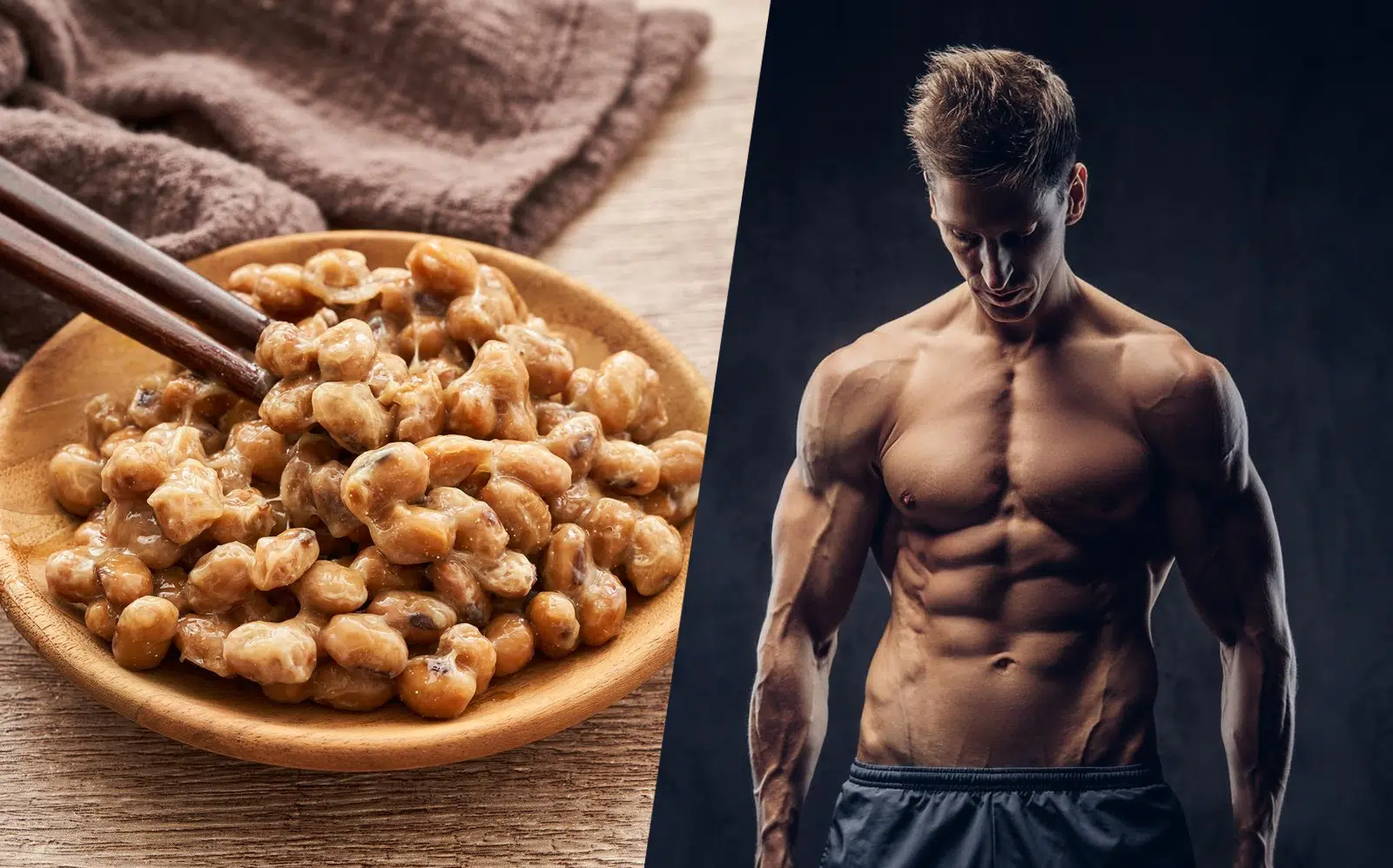I’ll be honest: For years, I’ve been pounding protein shakes after every workout to kickstart recovery and build bigger and stronger muscles. Research has backed the benefits of consuming protein after exercise for improving hypertrophy, immune function, and maintaining blood sugar balance. (1)
However, excess of everything is bad. Recently, my gut felt off, my energy levels were at an all-time low, and my gains plateaued. I returned to the drawing board to figure out what could be the reason for all this. Everything pointed in one direction — my post-workout nutrition.
Contrary to what sports nutrition companies and fitness influencers will have you believe, post-workout nutrition isn’t only about protein shakes. Our bodies are complex ecosystems, and our gut bacteria play a crucial role in recovery.
Close your eyes and think about the ancient times. Do you think the gladiators relied on protein powders or bars? Evidence suggests that fermented foods were the main component of their diet. These probiotic-rich superfoods nourish the entire system, resulting in optimal physical performance.
This discovery made me ditch the protein shakes in favor of kefir, kimchi, and natto. After almost two months of making them my post-workout staples, I noticed an improvement in my recovery, energy levels, digestion, and overall well-being.
In this article, I’ll share the three best fermented foods, reveal their unique benefits, and share three post-recovery nutrition ideas that go beyond just building muscle and focus on nourishing your entire body.
The Science of Muscle Recovery: What Your Body Really Needs
After a grueling workout, the body is undergoing multiple processes simultaneously. You must cater to each of the following factors to ensure optimal recovery:
- Protein: This shouldn’t be surprising. You need protein to repair the microtears in your muscles. Protein is the building block of muscle, and you cannot overlook it if you want to build muscle and strength.
- Inflammation: The degree of inflammation will vary depending on your training volume and intensity. The right post-workout recovery regime can help minimize muscle inflammation.
- Glycogen Stores: The body uses carbs in the form of glycogen as its primary energy source during a workout. You must replenish these stores to avoid energy crashes throughout the day.
- Gut Check: This factor often gets overlooked and is also the reason why most people fail to make any meaningful progress. The gut contains trillions of bacteria that play a significant role in nutrient absorption and recovery after exercise.
Gut Health: The Missing Link in Your Recovery Puzzle
Since I was dealing with chronically low energy levels and strength and muscle plateaus, I knew it was time to prioritize my gut health. In my 17 years as a trainer, I’ve seen firsthand how gut health can make or break someone’s fitness journey. Here’s why you must pay attention to it:
- Nutrient Absorption: If your gut microbiome is out of order, your body might not absorb crucial nutrients even if you are eating a balanced diet.
- Inflammation Control: A healthy gut microbiome helps regulate inflammation throughout the body. It can also help lower the chances of delayed-onset muscle soreness (DOMS) after a workout.
- Immune System Boost: Seventy to 80 percent of your immune system lives in your gut. A healthy gut microbiome can help you fight against illnesses and recover faster. (2)
Spotlight on Fermented Superfoods
Now that you understand the importance of gut health in supercharging your recovery, let’s explore the wisdom of our ancestors and look at some of the most effective ancient fermented foods that are packed with the nutrients and probiotics that your gut craves:
Here are the top three fermented foods (and a few bonuses) that should be a part of your recovery stack:
Kefir: The Creamy Probiotic Powerhouse
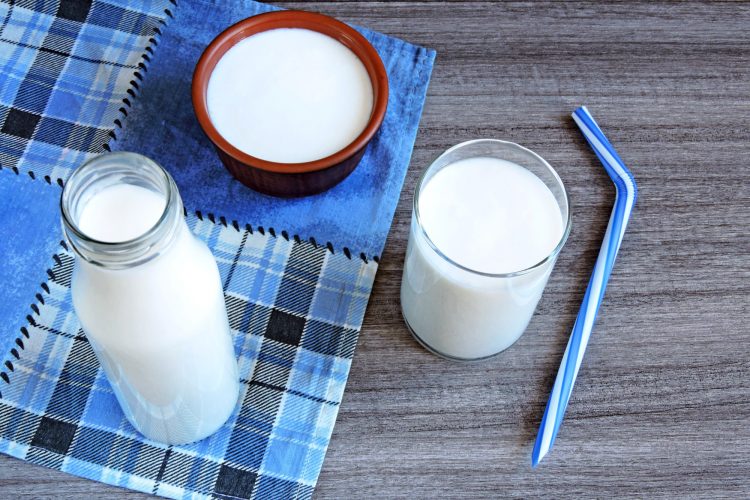
Kefir is a fermented milk drink similar to thin yogurt made from kefir grains, a specific type of mesophilic symbiotic culture. It is prepared by inoculating cow, goat, or sheep milk with kefir grains. Kefir is rich in calcium and vitamin K2, which is excellent for bone health.
Kefir, especially the homemade kind, is packed with probiotics. These bacteria promote a healthy gut environment, which in turn promotes muscle recovery and overall well-being. The probiotics in kefir have been shown to enhance muscle protein synthesis, maximizing gains. (3)
Kimchi: The Spicy Anti-Inflammatory Superstar
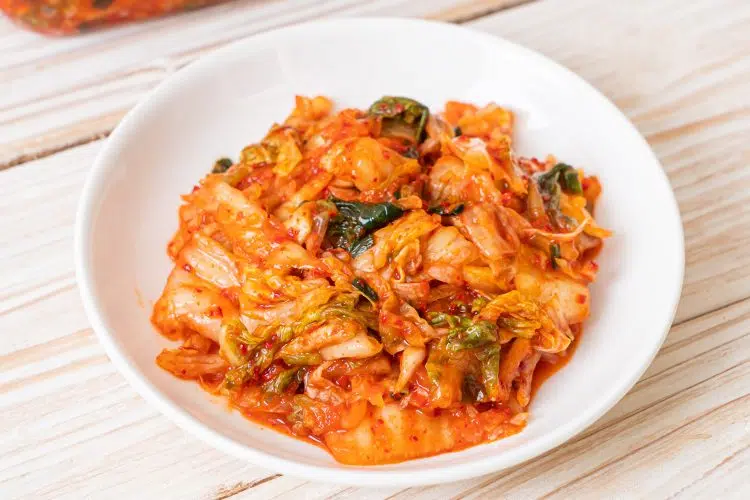
Kimchi is a traditional Korean side dish consisting of salted and fermented vegetables, most often napa cabbage or Korean radish, and a mix of garlic, ginger, and chili peppers. These compounds help minimize muscle inflammation and promote recovery.
Kimchi also contains a healthy dose of antioxidants that help eliminate free radicals in the body, which are a byproduct of exercise and lead to fatigue and aging. This dish also boosts insulin sensitivity, which is crucial for managing blood sugar levels and energy utilization.
Natto: The Sticky Vitamin K2 Dynamo
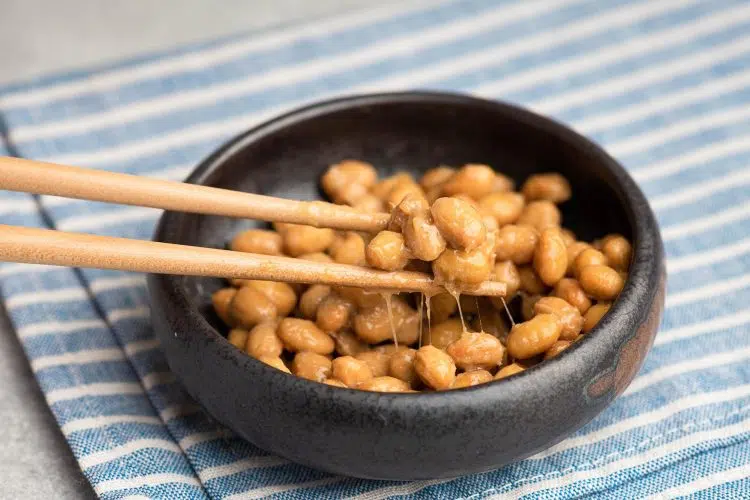
Natto is a traditional Japanese food made from whole soybeans that have been fermented with Bacillus subtilis var. natto. It is often served as a breakfast food with rice.
Natto is one of the best sources of vitamin K2 (even better than kefir), ensuring optimal bone health. Remember, strong bones are the foundation upon which strength and muscle gains are achieved.
Excessive muscle soreness can derail your fitness progress. Natto contains a unique enzyme called nattokinase that might help reduce muscle pain and inflammation. (4)
That said, natto is not as probiotic-rich as kefir. So, you must use a combination of both in your diet to ensure optimal recovery and overall well-being.
Additional Fermented Friends:
Here are a few other fermented foods that you can add to your diet:
- Sauerkraut: Finely cut raw cabbage that has been fermented by various lactic acid bacteria. It is packed with probiotics and vitamin C, an antioxidant that aids in tissue repair.
- Kombucha: It is a fermented, lightly effervescent, sweetened black tea drink that offers a unique blend of probiotics and organic acids that may support digestion and gut health.
- Tempeh: This food has gained a lot of popularity, thanks to the vegan movement. It is made from fermented soybeans and is rich in probiotics and fiber that help boost gut health.
- Miso: A fermented soybean paste, miso provides a savory umami flavor along with probiotics and beneficial enzymes.

Pro Tip: People new to fermented foods must start slow and analyze how their body reacts to the new diet. Switching too quickly can lead to stomach issues like diarrhea and indigestion, which can be counterproductive to your goals.
Putting it into Practice: My Fermented Food Recovery Plan
As someone who has been on the fitness bandwagon for almost two decades, I have experimented with multiple diets, and I’m constantly looking for something that gives me an edge and allows me to maximize my gains and recovery.
When I learned about the benefits of fermented foods, I knew I had to give it a try. However, this wasn’t an overnight switch. Initially, the idea of adopting kefir, kimchi, and natto sounded weird, to say the least.
Also, if you have never tried fermented foods, let me tell you — they smell, feel, and taste different. However, being the science-based lifter I am, I put all that aside and slowly started transitioning to fermented foods to power my post-workout recovery.
I started with a small serving of kimchi for my post-workout meal. As my gut and taste buds adjusted to these foods, I also added them to my lunch and dinner. Lo and behold, I noticed significantly less bloating, improved digestion, and surprisingly faster recovery times between lifting sessions.
Sample Fermented Food Meal Ideas
Here are three of my go-to post-workout fermented food recipes:
- Protein Smoothie: Blend Greek yogurt (a fermented food), berries, a scoop of protein powder, and a spoonful of kimchi juice (trust me on this). It’s oddly delicious and fuels those muscles.
- Salad: Add mixed greens with grilled chicken or fish, top with a colorful mix of fermented veggies like sauerkraut, kimchi, and pickled ginger. If it is too bland for you, drizzle your favorite sauce over it.
- Simple Side Dish: Have a bowl of miso soup with your usual meal. Miso is a fermented soybean paste that is packed with electrolytes and can aid hydration.
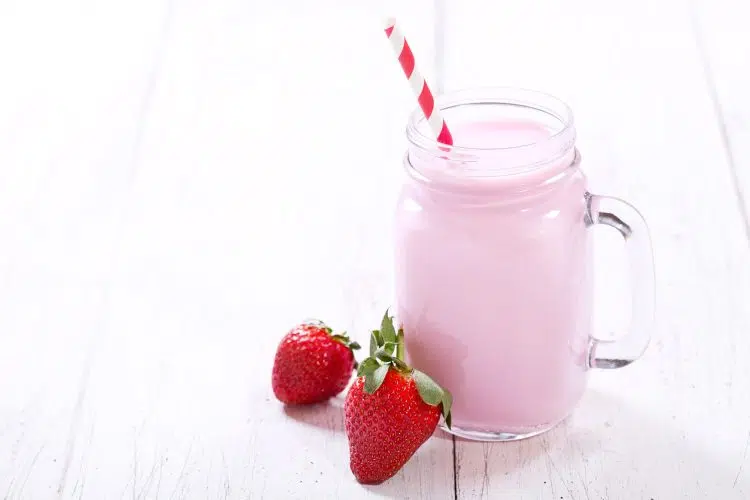
Timing: Aim to consume fermented foods within 30 to 60 minutes of your workouts. This is when your body is primed to absorb the nutrients and replenish glycogen stores. That said, don’t stress too much if you cannot manage it in this window. Any time after your workout is a good place to start.
Comparison: Fermented Foods vs. Traditional Supplements
You’re probably wondering how fermented foods stack up against the more traditional sports nutrition supplements. Here is a lowdown on everything you should know:
Pros and Cons of Fermented Foods vs. Traditional Supplements
| Feature | Fermented Foods | Traditional Supplements |
| Nutritional Value | Packed with vitamins, minerals, and probiotics. | Often isolated nutrients and contain artificial ingredients. |
| Digestibility | Easier on the gut and promotes a healthy microbiome. | Can cause digestive upset in some individuals. |
| Cost | Generally more affordable, especially if homemade. | Can be expensive over time. |
| Versatility | Can be incorporated into various meals and snacks. | Limited to shakes, bars, or capsules. |
| Taste and Texture | Unique, tangy flavor profile, diverse textures. | Often bland or artificial tasting. |
| Long-Term Health | Supports overall gut health and immune function. | Potential for long-term negative impact on gut health. |
Cost and Accessibility
It is no secret that high-quality protein supplements can cost you an arm and a leg. Most committed fitness enthusiasts (like me) end up spending a fortune on these sports supplements over the long term. Fermented foods, on the other hand, are a more budget-friendly option, especially if prepared at home.
Long-Term Sustainability
Beyond the cost factor, you must consider the long-term health benefits of the two sources. While artificial flavors and ingredients in commercial supplements can destroy your gut microbiome, fermented foods contain probiotics that allow these gut bacteria to flourish. It ensures the nutrients are absorbed well, and your immune system runs strong.
While I added fermented foods into my diet as an experiment, I will stick to them for the long term as I notice an overall improvement in my recovery rates, energy levels, digestion, and even my mood.
Conclusion
Fermented foods aren’t your run-of-the-mill supplements; they’re living, breathing powerhouses of nutrition that have been used for centuries to maximize recovery and boost overall health and well-being.
Remember, variety is key here. Don’t limit yourself to one fermented food. Incorporate different sources into your meals to get the best bang for your buck. But at the same time, start small and gradually increase the volume of the fermented foods in your diet as you build a taste for them.
If you need any help implementing these fermented foods into your routine, post your questions in the comments below, and I’ll be happy to help!
References:
- van Loon L. J. (2013). Role of dietary protein in post-exercise muscle reconditioning. Nestle Nutrition Institute workshop series, 75, 73–83. https://doi.org/10.1159/000345821
- Wiertsema SP, van Bergenhenegouwen J, Garssen J, Knippels LMJ. The Interplay between the Gut Microbiome and the Immune System in the Context of Infectious Diseases throughout Life and the Role of Nutrition in Optimizing Treatment Strategies. Nutrients. 2021;13(3):886. Published 2021 Mar 9. doi:10.3390/nu13030886
- Lee MC, Jhang WL, Lee CC, et al. The Effect of Kefir Supplementation on Improving Human Endurance Exercise Performance and Antifatigue. Metabolites. 2021;11(3):136. Published 2021 Feb 25. doi:10.3390/metabo11030136
- Chen H, McGowan EM, Ren N, et al. Nattokinase: A Promising Alternative in Prevention and Treatment of Cardiovascular Diseases. Biomark Insights. 2018;13:1177271918785130. Published 2018 Jul 5. doi:10.1177/1177271918785130
Tip: If you're signed in to Google, tap Follow.


